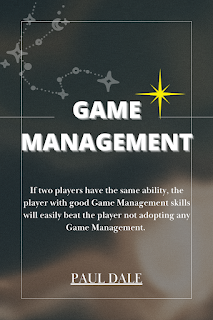IMPROVING YOUR GAME MANAGEMENT IN MATCHES
Many coaches believe that all points are the same, but in reality, there are normal and "Big" points. Your ability to distinguish normal points from the big points and take the necessary steps to win the big points more often than your opponent makes you much tougher to beat.
The significance of a point can vary depending on the context of the game, match or set. For example, a point at 40-15 in a game may be less crucial than a deuce point, which can determine the outcome of a game.
This ability to understand what is "normal" and what are Big points is called good Game Management. A player who understands Game management constantly adapts their shot selection choices throughout the match.
Game Management also involves the score, match stage and a point's psychological impact on the opponent. If you're facing a Break Point near the end of a set, serving an ace to bring the score back to deuce has relieved the pressure slightly, and being near the end of a set, your opponent was probably hoping to return your serve and contest the rally. Taking that chance away with the ace is psychologically tough for your opponent to take; but doing it several times on breakpoints can be devastating for them.
Many situations signify that a certain point is more important.
PRESSURE SITUATIONS
During pressure situations such as tie-breaks, game points and set points, you have a definite advantage if you can show your opponent something different or special.
Enter tie-breaks determined to hold serve on each point. As obvious as that sounds, many players often can't see the "trees for the forest". Their first serve percentage may have been in the low fifties for the entire set, but if they can adopt good Game Management practices, their first serve percentage in the tie-break should go up to the high seventies.
Likewise, you might have been trying to break your opponent's serve the entire set but only putting 40% of your returns into play. By adopting good Game Management practices, you begin to return every ball, forcing your opponent to do more and forcing errors from your opponent. Often, all that is needed is a bit of mental clarity and experience in Game Management.
BIG POINT AWARENESS
As a player, you've got to stay aware of when the Big Points arrive. Your opponent could be simply fatigued and showing signs of struggling. That's not the time to "leak" points early in the rally. You must eliminate errors and see how your opponent will handle the situation now.
There may be times when you need to increase your first-serve percentage, such as when your opponent is dominating your second serve but is far less aggressive and successful when your first serve goes in. There may also be times when you need to take more risks and hit aces. It could be because you're playing on a fast surface or your opponent has trouble returning a fastball. Whichever option you choose will require you to make a tactical and psychological calculation.
STRATEGIC AWARENESS
Many of the examples above have a strategic element to them. Give your opponent what they don't want, their least favourite option of speed (fast or slow), height (high or low), direction (wide or tight to the body), and position on the court (up or back).
With good Game Management, you sometimes leave your most effective weapons for the most critical times. If your opponent has trouble returning a wide serve to the deuce court, don't show them that serve too often. Mix up your target until you really need the point, and not at 15-all. This prudent use of directions, speeds, heights and positions is at the essence of good Game Management.
BIG POINT MENTALITY
Above all, a player must be constantly aware of the ebb and flow of a match. Experienced players monitor many things during a match, but the 5 most essential elements of Game Management are maintaining;
- High First Serve Percentage
- Consistent Returns
- Unforced Errors
- Pressure in the Rally
- Mentally Stable
SUMMARY
If two players have the same ability, the player with good Game Management skills will easily beat the player not adopting any Game Management. Game Management is, therefore, vital to winning matches and critical at the higher levels of our game, where small things make a tremendous difference.


.jpg)
.jpg)
.jpg)

%20copy.png)

I have bookmarked your blog, the articles are way better than other similar blogs.. thanks for a great blog!tennis strength and conditioning
ReplyDelete